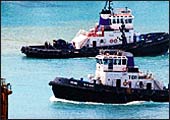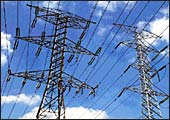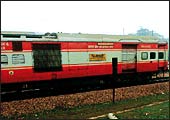 |
Atul Punj
Chairman, Punj Lloyd
GROUP TURNOVER
Rs 1,624 crore
ORDER BOOK SIZE
Rs 3,400 crore
KEY PROJECTS
Highways for Golden Quadrilateral roads project; Pipeline projects
in Turkey and Caspian Sea; Improvement work at Haldia Refinery
|
This
rainbow has pots of gold strung along every available point on its
spectrum, not just at its proverbial end. And picking up the cherries
(pardon the mixed metaphor) are construction magnates who are laughing
all the way to the bank-but only when they can find the time to
get away from making bids, monitoring work in progress and networking
with the movers and shakers of the government and the corporate
world.
Consider Atul Punj, for example. The 46-year-old
Chairman of construction major Punj Lloyd is watching the traffic
in Delhi's crowded Nehru Place through the glass-panelled window
of his fourth floor corner room. It's raining heavily and the scene
on the street below is chaotic. "It rains more often in Bangkok
but you never see a traffic snarl there," he can't help but
comment.
Occasional rains, VIP movements and hectic
construction activity often combine to give nightmares to drivers
in Delhi and elsewhere but Punj can't stop smiling. Because construction
barons like him smell money where others see only mess: wider roads,
flyovers, bridges, water supply systems, power projects, ports and
sundry other infrastructure projects are mushrooming all over the
country. And Punj has tasted blood. Riding this boom, he has more
than doubled his company's turnover from Rs 731 crore in 2002 to
Rs 1,624 crore in 2004.
More than 1,000 km away, in Mumbai, V.N. Paradkar,
Executive Director and CEO of Essar Construction, rarely gets a
chance to enjoy the view from his office overlooking Mahalaxmi Race
Course. With an order book of Rs 1,500 crore-spanning highways and
pipelines, and other projects-and already pre-qualified for another
Rs 2,500 crore of highway projects, Paradkar just doesn't have the
time. Essar is gunning for a whopping 72 per cent growth in revenues
from Rs 550 crore in 2003-04 to Rs 950 crore by the end of this
fisc.
| BUILD, OWN, OPERATE, & EARN |
 Roads Roads
Several projects like North-South, East-West corridors, Golden
Quadrilateral and the initiatives of the Ministry of Road Transport
& Highways to build approximately 24,000 km are underway.
Value: Rs 85,900 crore
 Ports Ports
Currently, there are only 12 major ports which handle about
75 per cent of the traffic. But several new ports are planned
while the existing ones will be upgraded. Besides, the ambitious
Sagarmala project to link all Indian ports is also on cards
Value: Rs 50,000 crore
 Power Power
Government aims to add 1,00,000 MW of hydel, thermal, and
nuclear power to meet the target of ''Power for all by 2012''
Value: Rs 27,800 crore
Pipelines
Pipelines as a transportation medium for oil and gas is 50
per cent cheaper than rail and 70 per cent cheaper than roads.
As a result, the next four years will see the building of
18,671 km of pipelines.
Value: Rs 40,000 crore
 Railways Railways
There is money to be made from the government's plans to modernise,
electrify, and double the existing lines as well as the adding
of new lines. The government has set up Rail Vikas Nigam Ltd
on the lines of NHAI to execute this programme
Value: Rs 15,000 crore
|
Clearly, infrastructure development is the sector
to be in right now. And with the central government taking an active
interest in the development of roads, ports, telecom, and airports,
the pie can only get bigger. Says Hetal Vora, construction industry
analyst at Edelweiss Capital: "Earlier, state governments were
involved in infrastructure development and this slowed down the
process. But, since 2000, the Centre has taken direct charge and
the change is clearly showing." The Centre's involvement in
infrastructure development has been accompanied by significant structural
changes in policy. For instance, the entry of concepts like build,
operate and transfer (BOT) and toll charges into the infra lexicon
has sparked tremendous private sector enthusiasm in the building
of infrastructure.
To get a view of what this means for contractors,
sample this nugget from Mumbai-based brokerage house SSKI. "Our
bottom-up assessment of projects underway and proposed indicates
that infrastructure investments would total at least Rs 3,91,900
crore in FY 2004-07... construction expenses would account for Rs
2,58,700 crore of the total spending, and would flow directly to
the order books of the companies," it says. Adds A. Ramakrishna,
President (Operations) and Deputy Managing Director, Larsen &
Toubro (L&T): "We estimate that investments of more than
$50 billion will be required in the infrastructure sector over the
next two years to sustain India's GDP growth at 8 per cent."
And this does not include the 1,00,000 mw of additional thermal,
hydro, and nuclear power capacity that will be required over the
next five-to-ten years.
The beneficiaries would include big companies
like Punj Lloyd, L&T Construction, Hindustan Construction Company
(HCC) and Simplex, public sector corporations like UP State Bridge
Corporation, NBCC, RITES and Ircon, as well as hundreds of small
and medium contractors. Adds Edelweiss's Vora: "The order books
of all major construction companies are full for the next two years
and they are not bidding for any new projects." This is a huge
turnaround from the times not so long ago when a shortage of fresh
orders forced contractors to undercut competitors.
 |
Jaiprakash Gaur
Chairman, Jaypee Associates
GROUP TURNOVER
Rs 2,437 crore
ORDER BOOK SIZE
Rs 10,000 crore
KEY PROJECTS
Working on at least 12 major hydropower projects like Chamera
II, Dulhasti, Tala, Sardar Sarovar, and Tehri. Also won the
bid for the Delhi-Gurgaon Expressway |
The runaway success of the Rs 54,000-crore Golden
Quadrilateral Project is a case in point. All the contracts for
the 5,952-kilometre road project-which connects Delhi, Kolkata,
Chennai, and Mumbai-have been awarded and the construction will
be completed by 2005. Though there is a one-year delay (the earlier
target was 2004), it marks a major change from the days of yore
when incomplete projects were the norm. Says Urjit Patel, Joint
MD of IDFC: "The Golden Quadrilateral Project has been a success
and contracts were awarded on time."
The other big project is the North-South and
East-West corridors linking Srinagar to Kanyakumari and Silchar
to Porbander- about 7,300 km of highways. About 25 per cent of the
contracts for this mega-project-which is scheduled to be completed
by 2007-have already been awarded and the rest will be awarded over
the next two years. Further, another 10,000 km of highways is being
developed by the Ministry of Road Transport and Highways. Contracts
worth Rs 2,490 crore for 622 km of roads were awarded recently.
The rest will be awarded in the next two years. Then there is the
Pradhan Mantri Gram Sadak Yojana (PMGSY), a scheme for improving
rural roads in 5.6 lakh villages. All these road projects put together
would mean construction contracts worth Rs 86,000 crore for construction
companies during the 2001-2007 period.
 |
V.N. Paradkar
Executive Director and CEO Essar
Construction
GROUP TURNOVER
Rs 550 crore
ORDER BOOK SIZE
Rs 1,500 crore
KEY PROJECTS
Construction of wells and water treatment plants for Madurai
Water Supply and Chambal-Dholpur Water Supply; Construction
of Baroda-Ahmedabad-Kalol gas pipeline for Gujarat State Petronet
Ltd |
It's not just roads that are keeping the cash
registers jingling at construction companies; there are power projects
(hydel, thermal, and nuclear), water transmission lines, oil and
gas pipelines, ports and railway tracks as well. The Delhi-based
Jaiprakash Associates has hydropower projects (12 dams) worth Rs
10,000 crore in its order books. These are slated for completion
by 2010. The icing on the cake is the operating margin of 16 per
cent compared to 8-9 per cent for other construction activities.
Biggies like L&T and HCC are betting big on hydropower construction,
while others like Punj Lloyd are planning an entry into this sector.
L&T's Ramakrishna informs that his company, which has built
65 power plants till date, is currently constructing six more. These
include a Rs 921-crore mega-order for the country's largest hydel
project (2,000 mw) in Arunachal Pradesh. "In the ports sector,
we expect to win a quarter to a third of the Rs 50,000-crore contracts
that will be farmed out in the next 10 years," Ramakrishna
adds. Incidentally, his company boasts an order book of Rs 16,500
crore as of March 2004.
Meanwhile, a Hyderabad-based upstart, IVRCL
Infrastructure & Projects, is making a killing in water projects.
E. Sudhir Reddy, Vice Chairman and Managing Director of IVRCL, says
he "is outrunning the boom". What the 43-year-old Reddy
means is that his company was among the early players in the country
to recognise the potential of water projects. IVRCL already boasts
a topline of Rs 776 crore, but Reddy is not resting his oars. "The
boom is waiting to happen," he prophesies.
 |
A. Ramakrishna
President (Operations) and Deputy
MD L&T Construction
GROUP TURNOVER
Rs 5,500 crore
ORDER BOOK SIZE
Rs 16,500 crore
KEY PROJECTS
Golden quadrilateral roads work like Kanchipuram-Walajahpet
Road, Surat-Manor Road; Subansiri Lower Hydroelectric Project
in Arunachal Pradesh; The Vivekanand Bridge at Howrah |
Oil and gas pipelines are set to become yet
another milch cow for the construction sector. Cash-rich oil companies
are planning to build an 18,671 km-long domestic pipeline network
over the next four years. Punj Lloyd, an established player in the
business, will be a major beneficiary. In January this year, the
company made history, though hardly anyone took notice. It completed
the 506-km Dahej-Vijaipur gas pipeline for Gail India Ltd in a record
four-and-a-half months, against a normal execution time of more
than two years, and it pocketed a neat Rs 500 crore for the work.
The company is working on a similar project in Turkey with a completion
target of 30 months.
 |
E. Sudhir Reddy
Vice Chairman and MD, IVRCL Infrastructure
& Projects
GROUP TURNOVER
Rs 776 crore
ORDER BOOK SIZE
Rs 2,000 crore
KEY PROJECTS
Drinking water projects of Gujarat Water supply board and Chennai
Metro water board, tunnelling job for Konkan Railway Corporation
in J&K, and Srikakulam-Palasa (74 km) road for NHAI |
But despite these golden opportunities on the
asset side of its balance sheet, the sector has a long list of liabilities
to contend with as well. The first is the fragmented nature of the
industry. Despite the presence of a few biggies with sophisticated
project execution skills, the construction industry has thousands
of players, most of them small and unorganised. In such a scenario,
the bigger players are likely to bag the mega projects, while the
smaller companies carry out contracts at the lower end of the value
chain.
Also, you need strong financial muscle. "If
the client delays payments, your cash flow can suddenly go for a
toss," informs H.P. Kanoria, Vice Chairman of SREI Infrastructure
Finance, which pioneered private sector financing of infrastructure
construction in India. Still, access to finance remains a choke
point, and despite the promise the sector holds, it hasn't attracted
enough private equity funds. Then, companies have to grapple with
a fluid policy regime and the bureaucracy as the business has a
significant interface with the government (which promotes a majority
of infrastructure projects). Since different arms of the government
often work at cross-purposes, companies need to possess a high degree
of political management skills, especially when projects span two
or more states. Law and order is also a problem in some states.
Indian companies also need to develop skills
for forming and working within consortiums when bidding for large-scale
projects. Says Vinayak Chatterjee, Chairman of Feedback Ventures,
an infrastructure consultancy: "We have miles to go for consortia-based
bidding." But with projects worth thousands of crores of rupees
in the bag and much more of the same in the pipeline, construction
companies have little reason to complain.
-additional reporting by Arnab Mitra,
Abir Pal, Nitya Varadarajan and E. Kumar Sharma
|
